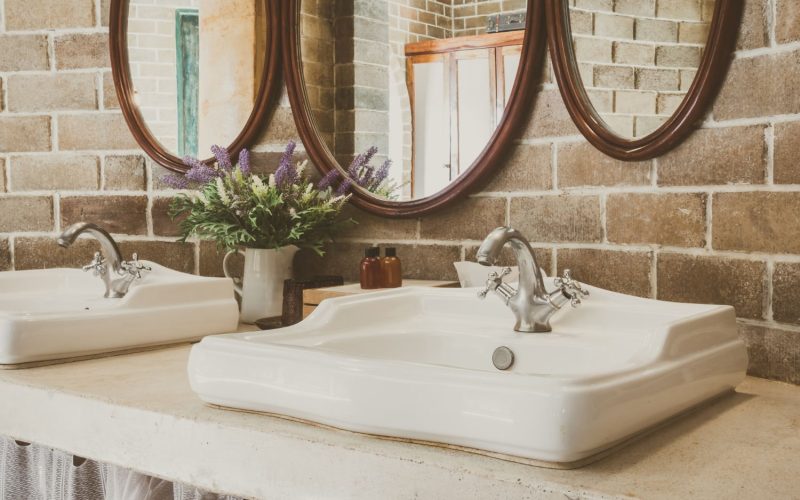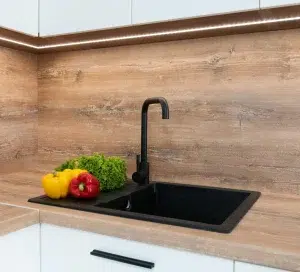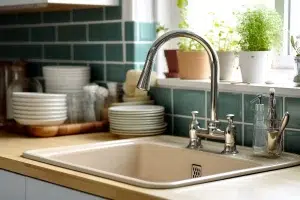The myriad basin faucet options available can be overwhelming, but with careful consideration, you can transform your bathroom into a space that perfectly suits your needs and aesthetic preferences.
From proportionate sizing to installation types, styles, valve options, and finishes, every detail matters.
Hopefully, this guide will navigate you through the essential factors, ensuring that the basin faucet you choose not only enhances the functionality of your space but also adds a touch of sophistication and charm to your bathroom decor.
Table of Contents
Toggle6 Things to Consider in Choosing Bathroom Basin Faucets

When selecting the ideal bathroom basin faucets, various factors should be taken into account to achieve optimal functionality and aesthetics.
Take note of these essential aspects before making your decision:
1. Sink and Faucet Must Be Proportionate in Size
Keep the faucet size proportional to the sink, ensuring the spout reaches the middle of the basin and maintains an appropriate height above the vanity or countertop.
This will make the faucet installation easier and more convenient.
2. Installation Type and Number of Holes
Choose a faucet based on the sink’s arrangement.
Check available installation holes before purchasing, as insufficient holes may necessitate a minor remodel, requiring a new sink or vanity.
The holes needed for a faucet depend on the faucet and sink design.
Standard sizes for kitchen and bathroom faucet holes are usually 1 3/8 inches in diameter, but some kitchen faucets may need a wider 1.5-inch hole.
Standard faucets (non-air-gap), with or without tubing, typically need a hole that’s 7/8″ to 1-1/8″ in diameter.
The required number of holes varies based on the faucet type; a single-hole faucet needs one hole, while a widespread faucet requires three separate holes.
Always check the manufacturer’s specs and sinkhole configuration before buying to ensure a proper fit.
3. Consider the Faucet Style
There are a lot of faucet styles in the market.
For your reference, here are the five most common faucet styles:
- Lever handles – known for their versatility across kitchen sinks, showers, and bathrooms
- Single-handle faucets – appreciated for their sleek design suitable for smaller bathrooms
- Two-handle faucets – equipped for easy operation and compatible with sinks featuring three holes with 4- or 6-inch faucet centers
- Pullout faucets – featuring a flexible spray head for enhanced washing and rinsing;
- Widespread faucets – offering diverse style options with individually installed handles in a more widespread configuration.
These styles cater to various functionalities and design preferences for applications in kitchens and bathrooms.
4. Valve Type
Prevent drips by opting for faucets with ceramic valves. While other valve types are generally drip-free, ceramic valves offer unmatched long-term reliability.
5. Faucet Finish That Matches Your Space
Popular faucet finishes you can consider include the following:
- Polished Nickel – offers a shiny and timeless silver finish
- Satin Nickel – known for its matte appearance, durability, and water spot resistance
- Matte Black – provides a modern and bold statement
- Satin Brass – introduces a warm, golden touch of luxury
- Stainless Steel – offers a classic and durable anti-corrosive finish
- Classic Bronze – adds a warm, rustic, and traditional look
- Chrome – a versatile and easy-to-clean shiny silver finish
- Unlacquered Polished Brass – provides a vintage and classic gold finish
- Black Nickel – offers a dark, modern, and edgy appearance
- Antique Pewter – presents a muted, vintage, and rustic aesthetic.
Each finish provides distinct aesthetics and design choices for various kitchen and bathroom applications.
6. Other Considerations
Check for obstructions like low-hanging cabinets, diverse backsplash materials, wall sconces, or extra-deep sinks. Ensure the chosen faucet has a matching reach for a seamless fit.
By carefully considering these factors, you can confidently select a bathroom basin faucet that aligns with your practical needs and aesthetic preferences.
Common Types of Faucet Handles
Explore the various faucet handle options, each designed for specific applications and preferences:
Lever Handles
Versatile and popular, lever handles are suitable for kitchen sinks, showers, and bathrooms. Available in single and double-handle varieties, they offer compatibility with a wide range of faucet attachments.
Pull-Down Faucet Handles
Commonly found in kitchens, these handles feature a gooseneck spout, allowing the spray head to extend downward into the sink. Known for their functionality, they are a preferred choice for kitchen faucets.
Single Handle
Ideal for smaller bathrooms, the single-hole faucet, or single-handle faucet, boasts a sleek and simple design. It provides individual controls for hot and cold water, offering convenience in a compact form.
Two-Handle
Featuring two handles for easy operation, this faucet type is suitable for sinks with three holes. The spout and handles are fixed on a base unit mounted directly on the sink.
Widespread Faucets
Offering style variety and options, widespread faucets have individually installed handles not attached to the spout-mounting base. They consist of three separate pieces, providing a more widespread configuration.
Key Takeaway
When selecting practical basin faucets for your bathroom, prioritize proportionate size, considering the faucet’s reach and spout height.
Choose the appropriate installation type based on your sink configuration, ensuring the right number of holes.
Factor in the faucet style, and valve type for drip prevention, and opt for finishes like solid brass or corrosion-resistant materials.
Check for obstructions and ensure compatibility with your bathroom’s design.
You can also consider choosing a reliable basin faucet manufacturer so you can make informed decisions.




